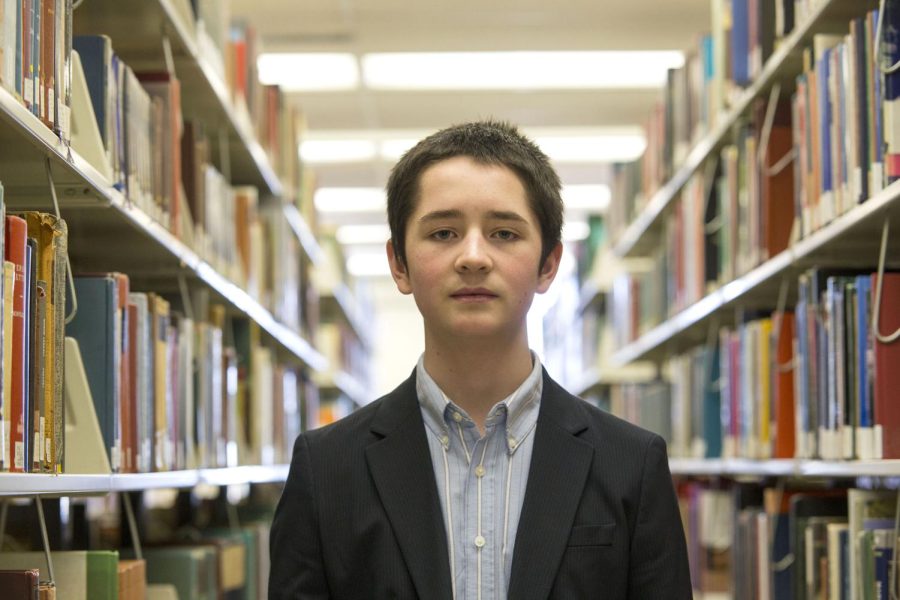Learning at all ages: Starting college at 13 years old
Vlas Zyrianov, a 13-year-old Kent State student, in the University Library on Wednesday, April 13, 2016. Vlas is the youngest student to take classes at Kent State University.
Vlas Zyrianov walks across the Kent State campus in the shadows of the students walking along the Esplanade. He waited in the lobby of the 12-floor building, dressed in a business casual attire — a striking combination of adult and child as he fumbles with the Chinese textbook in his briefcase.
Zyrianov has taken an interest in computer programing, aviation and international relations. Though he hasn’t figured out what he wants to major in, he hopes to maybe declare one — by high school. At just 13, Zyrianov is already finishing his second semester of college coursework.
“So far I’m not 100 percent decided, maybe double major, but I’m guessing so far computer science, I want to do something like that,” Zyrianov said, his Russian accent seeping through the syllables.
Both of his parents were very encouraging when he decided to start the application process for College Credit Plus at the end of 6th grade.
College Credit Plus is a program through the Ohio Department of Education that allows students in grades 7-12 to take college coursework while enrolled in a public or participating private school. Universities admit students based on their college readiness in certain subjects.
“My dad is pretty smart; he helped me do this whole thing. I would classify him as a walking encyclopedia,” Zyrianov said. “You can ask him pretty much anything.”
A current 7th-grader at Stanton Middle School in Kent, Zyrianov is the school’s first student to enroll in the program, said the middle school’s principal, Anthony Horton.
“We’ve had many good conversations with him and his parents to make sure the program was a good fit, and so far it has worked out great,” Horton said.
Zyrianov said his school has been supportive through the whole process.
“It wouldn’t have been possible without the support of them,” he said.
Like many other incoming college students, Zyrianov took the ACT to determine if he was ready for college. Getting a composite score of 24 on the test allowed him to take Elementary Chinese I and II and introductory computer science courses.
Nicolle Di Domenico, a freshman physics major and Zyrianov’s classmate, said she was surprised by how attentive he is in their elementary Chinese II class. She said he always asks questions and seems to learn the material very quickly, she said.
“He is smart, but I also feel he’s humble,” Di Domenico said.
Students in the class learn the Chinese words for residence hall, cafeteria or dining hall and others, Di Domenico said — words that might not be applicable to Zyrianov because of his unique status.
“He can’t really use the words in daily life,” she said.
Julia Levashina, Zyrianov’s mother, has never considered her son especially advanced compared to his peers. To her and the rest of his family, he has always been a normal child. She said she feels other children advance at a slower pace than they should.
“I worry that other children advance very slow, especially in mathematics, sciences, history and literature, due to the lack of opportunities they have, as well as the hurdles for education created by games and the internet,” Levashina said.
Even so, Levashina said Zyrianov has many friends who play games online together on a site called Steam or chat through Skype, meeting up at either his home or another place about once a month.
She said she has never heard about any of Zyrianov’s friends taking an interest in learning new concepts like her son.
“I think playing is the only activity Vlas’ friends do, thus that is what they do when they meet,” Levashina said. “I have never heard that they read any books, travel outside of the state, learn something interesting or get skills in anything.”
For fun, Zyrianov flexes his computer science knowledge by creating programs for practice. His latest creation is a text-frequency analysis software that can count the words of different documents at once, compare them and import them into a program like Excel.
“So far, none of them are published,” he said. “Maybe in the future sometime.”
Zyrianov’s also traveled extensively in and out of the country, visiting his family in Russia, as well as trips to China, Jamaica and Scotland. He hopes to visit Crimea and Donetsk, Ukraine, in the future.
Zyrianov plans on continuing with College Credit Plus through high school.
“You can learn some stuff that wouldn’t be previously available,” Zyrianov said. “I really like this opportunity.”
Olivia Minnier is an administration reporter for The Kent Stater. Contact her at [email protected].



